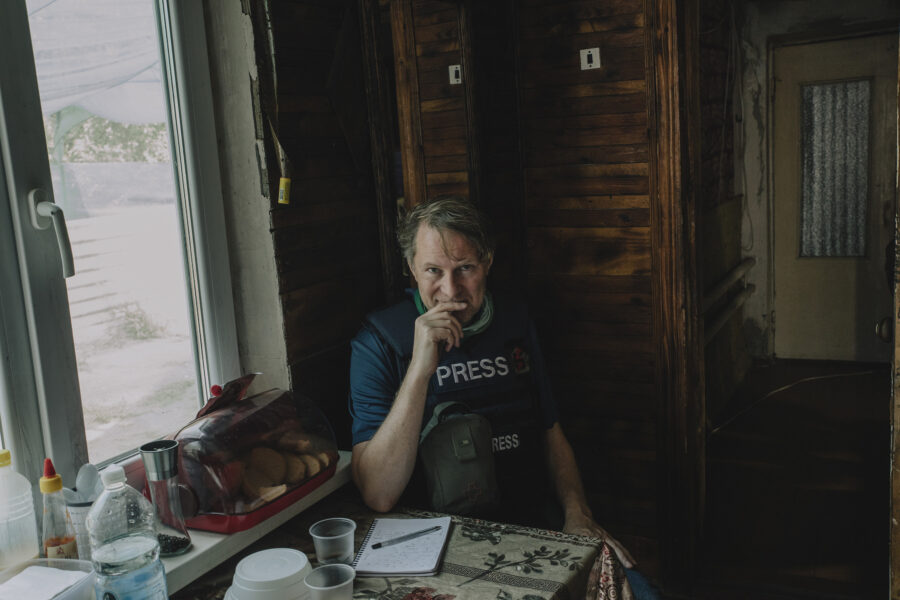
Warning – article contains graphic descriptions.
Part 1 – The Road to Kyiv
Amy Rushton writes…
The most important reporting shapes lives by revealing untold stories, but most journalists rarely get to see the tangible effects of their writing. For Guardian foreign correspondent Luke Harding, the effects of his reporting can be seen in the row of Ukrainian refugees attending his talk at the University of Exeter, personally thanking him for his love of Ukraine – its culture and its people – and his relentless commitment to telling the real human stories behind Putin’s invasion.
The talk centred around Luke’s latest book, Invasion, in which he focuses on the human tragedies behind the headlines of the Ukraine war. His approach is informed by over 20 years working in foreign correspondence, writing from all over the world – Afghanistan, Baghdad, Moscow and, most recently, Ukraine.
Exeposé were lucky enough to sit down with Luke before his talk and discuss his experiences of growing up in Exeter, reporting on war and his hopes for the future of Ukraine.
Luke spent six years in Exeter as a child, and his mother worked as a counsellor at the University. Many of his earliest memories were shaped by the city – from the dubious honour of becoming the Bishop’s book boy, which involved kneeling during long sermons and holding an enormous leather bound book for the Bishop to read, to acting as Jesus in a play on the lawn of Exeter Cathedral. Neither made a long-term mark – Luke became a committed atheist by the age of 13 – but he enjoyed Exeter.
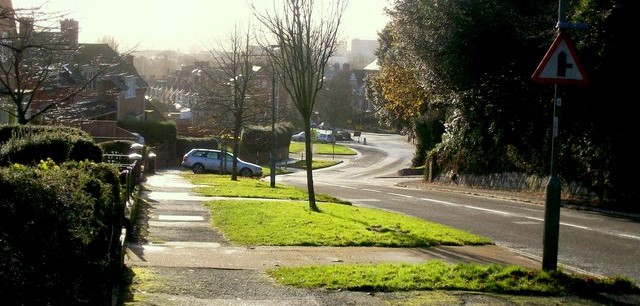
Living in Stoke Hill, Luke recounted Exeter City football matches when- adorned in a red and white scarf – he and his father would turn up only to the last 20 minutes of the game when they could get through the gates for free.
But it was Oxford that cemented a love of journalism for Luke. After abandoning a short-lived career in acting, he started writing for the student newspaper, Cherwell, which he went on to edit.
“I sort of found my tribe. The kids who were journalists, they were pretty smart, but they also pretty informal. They wanted to have adventures and make mischief and that’s really what I wanted to do as well, and I sort of still am.”
“They wanted to have adventures and make mischief and that’s really what I wanted to do as well, and I sort of still am.”
The road from there was more rocky – after facing rejections from national newspapers post university he worked at the Evening Argus in Brighton for two years. We asked how he felt the decline in local journalism was impacting Britain
“It was very important for the community and for a sense of local identity. Local papers protected against disinformation and echo chambers – if you lived there you could agree on the nature of reality. Now, its not so bad in the UK, but in the US people can’t even agree on what facts are and what reality is. Half of Americans think that Donald Trump won the 2020 election because that’s what they’re told by Fox News.” He suggests the only way to combat this is pumping more money into news at local levels, rather than what we see now- a decline in funding at all levels.
His advice for aspiring journalists is more optimistic and boils down to one thing – practice. You need a bit of talent he explains, but if you can write you can get better at it too.
From the Evening Argus Luke went to the Daily Mail, although he couldn’t stand its politics. It became too much in the run up to the 97’ election, when he left for The Guardian. His first big story was the Jonathan Aitken libel case and from there it was foreign correspondence – covering 9/11 in Delhi, wars in Afghanistan and Iraq, Berlin with side trips to Baghdad and eventually Moscow in 2007.
In the Summer of 2006, Luke was working in Berlin. During a meal with his boss, he was told he needed a bigger canvas.
“By that, she meant no one else wants to go to Moscow so we’re sending you. I remember saying I don’t actually speak Russian, I speak German. And she said ‘languages, they’re all the same you can learn’. So I started learning Russian the next day and we went off to Moscow”
Initially he underestimated Russia, believing he would turn up to a semi-democracy. Russia however, turned out to be “darker and more challenging” than he or his wife, travel-journalist Phoebe Taplin, could have imagined.
Tensions at that point were high between Russia and the UK. It was only shortly after Alexander Litvinenko, a former Russian intelligence officer, was poisoned with a radioactive cup of tea in London. He says his time in Russia at times felt like a ‘bad spy thriller’. Luke was followed in the street by FSB agents, regularly had his phone calls intercepted and his family home broken into.
Luke was followed in the street by FSB agents, regularly had his phone calls intercepted and his family home broken into.
“They made it obvious they were bugging you because they would cut the line if you made a joke about Putin you’d get a static noise. So then you make another joke about Putin and they cut the line completely”.
One particularly memorable incident saw Luke returning home to find a sex manual had been planted on his bedside table.
“It was a silly, clownish Cold War kind of thing – for about three and a half years nothing we did was private. You make jokes about it because the answer to that darkness was to joke about it”
When he reported this back to London, he was told it was a standard intimidation technique. Nonetheless, there were deeply chilling moments. He recounts how he was once brought to Lefortovo prison, the FSB’s detention centre where Wall Street Journalist Evan Gershkovich was recently detained, in one of the many times he feared for his freedom whilst in Russia.
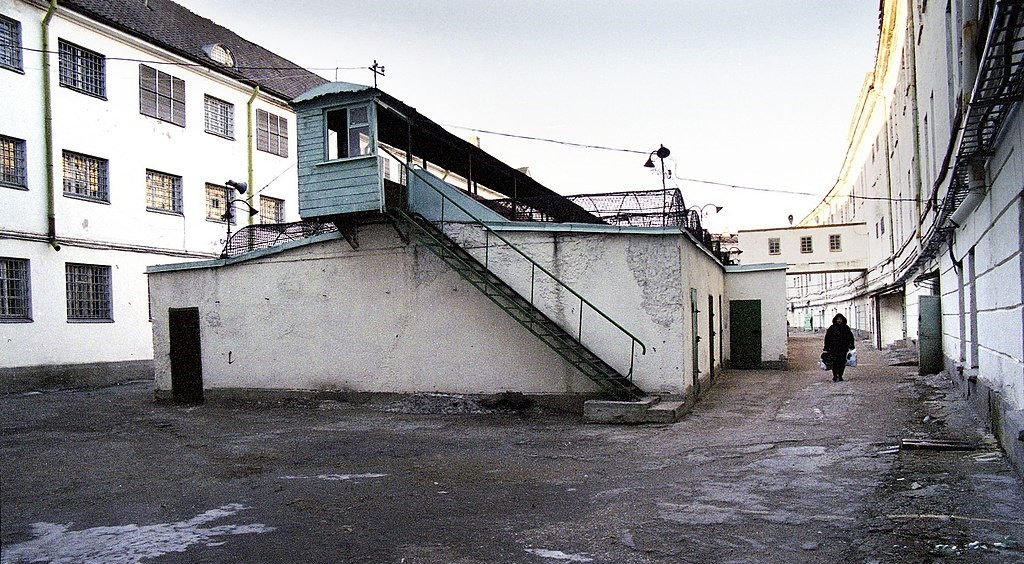
The safety and treatment of journalists has fast become one of the biggest issues when reporting on Russia. Luke describes how Russia has become a totalitarian state where independent media is finished – “The most creative people have left or been killed and the rest are living with the understanding that anything could happen to them at any moment if they offend power […] Russia’s the world’s foremost spy state”.
This extended into harassment and threats aimed at foreign journalists. Access is a common challenge in foreign reporting – Luke notes how The Guardian has been “trying to get into Gaza for more than a year since October 7th, and the Israeli Government hasn’t let us.” This problem is particularly bad in Russia – after his unflattering coverage of the regime, Luke was denied re-entry to Russia in 2011, making him the first foreign reporter expelled since the end of the Cold War. But Luke’s experiences in Eastern Europe were only just beginning.
Part 2 – The Fog of War
Callum Martin writes…
On the evening of February 23, 2022, Luke was in Kyiv, having dinner with friends. Everybody was enjoying themselves. There was Odesan wine, honey vodka, pork zakuski, and that most crucial element of any dinner party – good conversation.
Shortly before midnight, he rose to say his goodbyes. After embracing his hosts, Luke left the warmth of the flat to trudge home through the night. But his journey was interrupted. A phone call from one of his contacts, who had previously served in Ukraine’s foreign ministry. Their message?
“The invasion will begin at 4:00 am.”
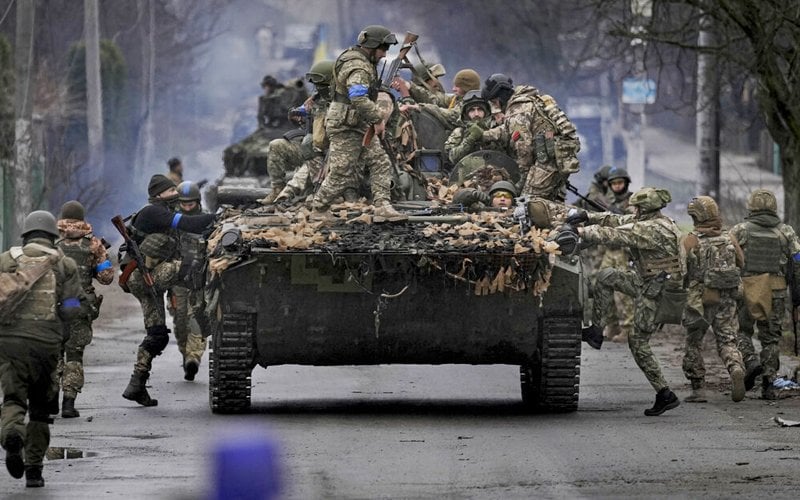
Depressing as it was, the call didn’t take Luke by surprise. Putin had been telegraphing his intention to subsume Ukraine into a new Russian Empire since at least 2014, when Russian forces annexed Crimea.
Seven months before Luke’s dinner party, the Russian President had published ‘On the Historical Unity of Russians and Ukrainians’, a 5000 word public essay denying the legitimacy of Ukraine’s contemporary borders. It argued that Russians and Ukrainians were ‘one people’, separated only by cruel historical injustices. The essay preceded a large build up of Russian troops and equipment on their Western border with Ukraine, as well as in Belarus.
The increasing volatility of the situation had caused Luke to return to Ukraine the previous December, where despite the danger, he had found that “people were pretty complacent.”
“Ukrainians didn’t want to believe it […] I don’t think Zelensky wanted to believe it either. I believed it. I didn’t think it was a feint, or a bluff. I thought a big, big invasion was coming.”
“I didn’t think it was a feint, or a bluff. I thought a big, big invasion was coming.”
At 4:30am on February 24, this grim prediction came true. Missiles and artillery began bombarding Kyiv, Kharkiv, Odessa and the Donbas. Simultaneously, Russian ground forces swept into eastern Ukraine in the most brazen violation of European borders since the Second World War.
“In those first few days, pretty much everyone thought that Kyiv would fall. By which I don’t mean people sitting in London or Washington – everyone in Kyiv thought the city would fall, which is why millions of people were trying to leave. The motorways to the West were completely clogged.”
According to Luke’s contacts, the Russian plan was “to send in commandos, storm the presidential palace, execute Zelensky, display his body on Russian TV, kill all of his Cabinet and in pretty quick order, subdue any opposition and install a puppet government in Kyiv.”
But Putin had underestimated the Ukrainian resolve. Within the Kremlin echo chamber, he had been advised that the Ukrainians would gratefully welcome their new Russian overlords, and that the Russian tricolour would be raised over the Rada within a fortnight. 31 months on, and he’s still waiting.
Part of this resilience has come from the courageous leadership of President Zelensky. Luke says that the day of the invasion is the day Zelensky “went from being a good President to a great President. Before the invasion, his ratings were actually falling. But everyone assumed he would run away. The Americans offered to help him run, and he stayed.”
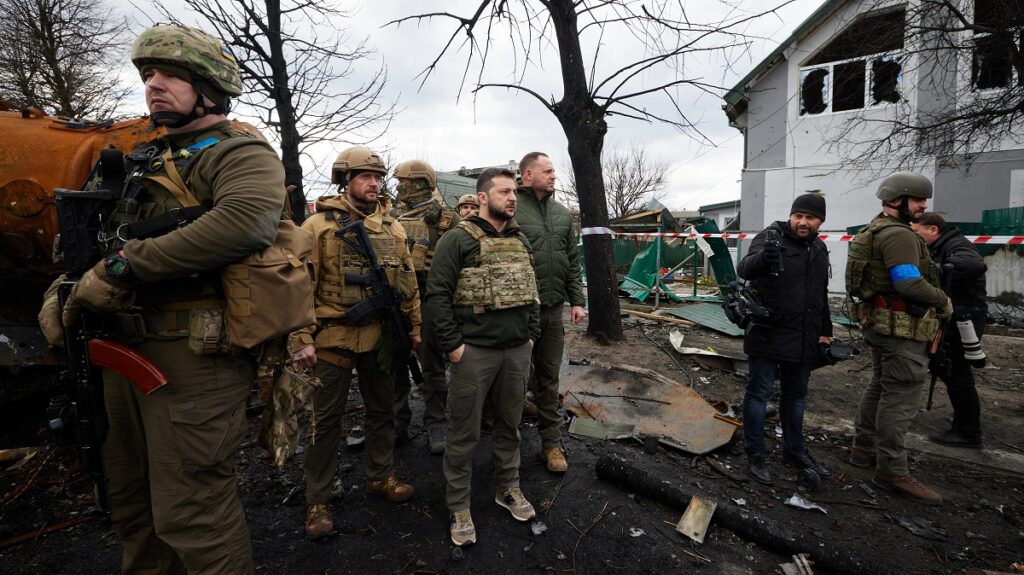
The Americans and the British might have warned Ukraine shortly before the incursion, but Luke is highly critical of the West’s overall policy towards Russia in the years since Putin’s accession. He says our thinking has been “conventional and unimaginative. We were treating the Russian government like a government, whereas in reality it’s a bunch of hyperactive gangsters from the KGB.”
“We’re like the kid at the back of the class who’s just a bit slow. There have been ample warnings that Putin was capable of anything. I mean, he stole Crimea, and the West’s reaction was a few words of outrage, which he doesn’t care about, and a few sanctions against minor officials, whose names no one can spell.”
“We’re like the kid at the back of the class who’s just a bit slow. There have been ample warnings that Putin was capable of anything.”
“In this country, not once, but twice he sent assassins to kill people he didn’t like, rattling around Salisbury or roaming around Soho with polonium. This is insane stuff.”
“It’s a failure of imagination. We thought he couldn’t possibly invade Ukraine because no one had invaded a sovereign country on this scale for 80 years. Well, he can and he did and he has.”
Two and a half years into that invasion, and there is ample evidence of Russian war crimes. The most visceral section of Luke’s book recounts what he saw in the northern city of Bucha, where he travelled in April 2022, shortly after the Russian withdrawal.
“It was a horror show. What made it singularly awful in Bucha was that the Russians were killing civilians. I’ve seen a lot of dead combatants, but here they were rounding up guys who had nothing to do with anything and torturing them and executing them.”
“I tell the story of this one 24 year old. Dragged from his house, taken down the street and then tortured. They broke his arm. He was just a regular kid. They told his mother that he would return in three weeks.”
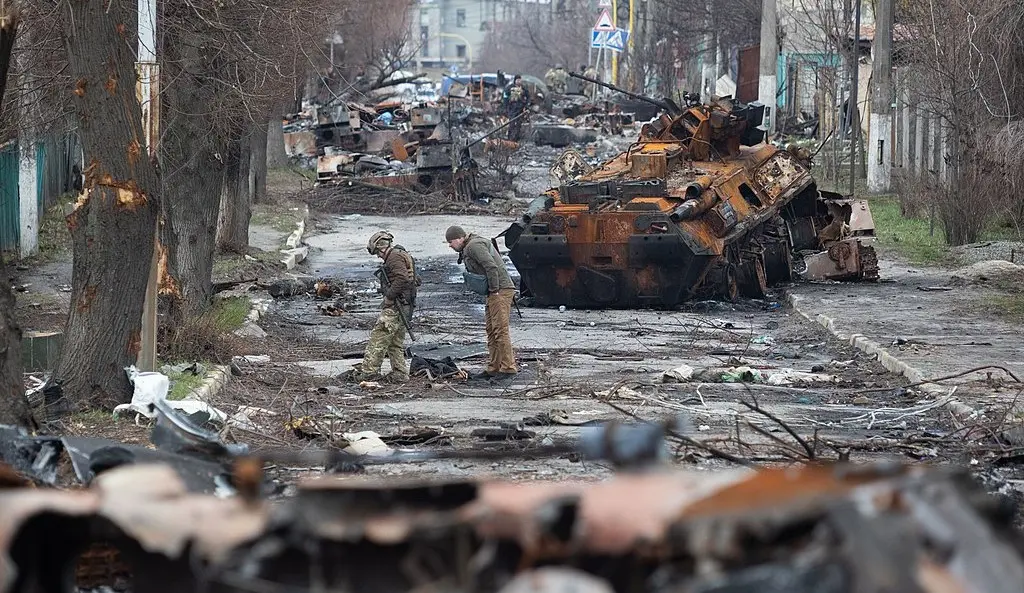
“I go down the road and his aunt shows me where he’s been kept, locked in this basement cellar. They made him kneel, and shot him in the back of the head.”
“They did this all over the region. They killed 1600 people, they raped women, shot up cars with kids in them. Killed whole families and burned the bodies. It was mediaeval savagery, licenced by the state, licenced by the Kremlin. The people who did this were promoted.”
“It was mediaeval savagery, licenced by the state, licenced by the Kremlin. The people who did this were promoted.”
“It’s important to tell this so that people know what’s going on, but it’s also important to show why doing a deal where the Russians get to occupy 20 per cent of Ukraine doesn’t work. It would mean the people living in those zones can experience the same kind of predation at any moment. So Ukraine has to win, but they can only win if we give them enough stuff.”
When it comes to the international stage, Luke says Zelensky’s background in entertainment has served him well, but it’s still not enough.
“I saw Zelensky recently in Kyiv. He has a plan to end the war, but it involves more military support from Allied countries, pressure on Russia, and permission to hit targets inside Russia with long range strikes, which the Biden administration won’t give.”
“I do worry about support. I’m curious as to why Keir Starmer has not yet been to Kyiv. He really should have gone by now but he hasn’t.”
“Ukraine’s been very good at reaching out to international publics […] the problem now is how to engage when the war still goes on, there’s no resolution. Ukraine is losing, sort of losing – on a relatively small scale, but nonetheless it’s going backwards in the East.”
And it’s exactly this static, grinding nature of the war that has contributed to what some commentators have called ‘Ukraine fatigue’ – the idea that global interest in the conflict is waning. Luke doesn’t buy it.
“It’s the obvious interpretation, but I’m not sure it’s quite right. It clearly doesn’t help that there’s a huge and spreading regional war in the Middle East. But our stuff still gets pretty well read on The Guardian. There’s definitely an audience for it, definitely people who care.”
“The scale of the war, the horror of the war, hasn’t diminished. If anything it’s got worse. The frontline is almost 1000 kilometres long. People die all the time, every hour. Huge numbers of Russian troops are being killed on a scale that we haven’t seen since Stalingrad. I’ve watched them die. So I think it’s important we don’t look away.”
“The scale of the war, the horror of the war, hasn’t diminished. If anything it’s got worse.”
One man who would look away is Donald Trump. At time of writing the US election is less than three weeks away, and while he’s currently trailing in the polls, there’s every chance Trump could return for a second term – an outcome that would likely spell disaster for Ukraine. Trump has close ties to Russia (covered in Luke’s book Collusion) and has indicated that if re elected he would turn off the taps on US military support to Ukraine.
“Witting or unwitting. Trump behaves like a Russian asset. If he were to win in November, it’s clear that he would cut off all American military aid to Ukraine and come out with some peace deal which involves Russia taking what it’s got and possibly some more. And then telling [Ukraine] to suck it up.”
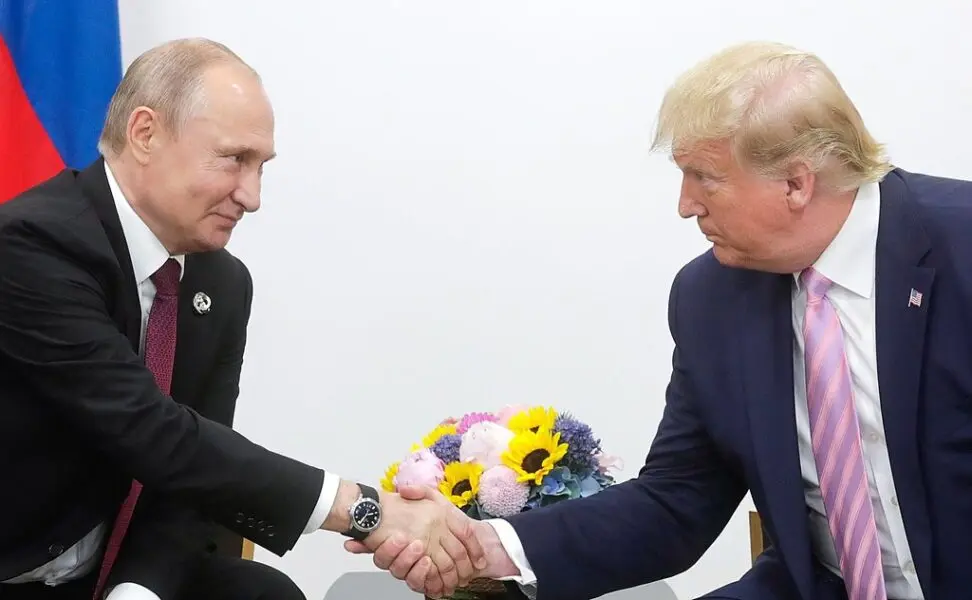
“That’s the scenario that Russia wants. I don’t think Ukraine will collapse because there’s still stuff coming from the Europeans. But definitely, eastern Ukraine will be lost.”
A Ukraine capitulation would “be a disaster for the rest of the planet as well. It would further embolden Putin, which means after Ukraine, he may think about redrawing the map somewhere else. His ambitions are not limited to Ukraine.”
Western support has also been hamstrung by fears of ‘escalating’ the conflict. In any war involving superpowers, there is always the underlying anxiety that it might go nuclear. It’s a threat that Putin has issued regularly, but in Luke’s opinion, it’s an empty one.
“It’s just a blackmail and a scare tactic – one the American administration has rather stupidly fallen for. What you have to understand about Putin is that he’s a coward. Alexei Navalny called him a cowardly little man in a bunker and that’s exactly what he is. What’s stopping him is not that he has got any qualms about killing millions of people – he doesn’t. It’s his fear that the Americans would drop a bomb on his head.”
“Alexei Navalny called him a cowardly little man in a bunker and that’s exactly what he is.”
During the interview, we asked Luke to reflect on the personal impact of war reporting – the physical danger but also the mental toll. Regarding the former, he acknowledged that “quite a few journalists have been killed, so you know it’s a risky environment.”
“One time in 2022 we were driving towards a place called Mariinka to meet a commander. The road became more and more deserted and it felt increasingly spooky, but we kept going. At one point, we looked on the map and saw we were very close to the Russians.”
“Finally the commander appeared. We both got out, shook hands and then heard the sound of incoming mortars. It was a kind of whiz, rather than a bang. I shouted “HELLO”, and then “GOODBYE” and ran to our vehicle and drove off at 100 miles per hour. It’s the shortest interview of my career.”
Alongside the physical threat, exposure to horrors such as Bucha carries a psychological burden. Luke previously suffered mild trauma after reporting from Afghanistan.
“I’ve seen a lot of bad stuff […] but at least I can just leave. The Ukrainians are stuck in this cycle forever, of waking up at midnight every night because there’s an air raid siren and explosions. So yeah, I’m OK, but spare a thought for those in Ukraine who can’t leave.”
We finished by asking Luke if he was planning on writing a follow up to Invasion. He wasn’t sure.
“The book I’d really like to write is about the fall of the Russian Empire and the end of Putin. It just hasn’t happened yet.”
‘Invasion: Russia’s Bloody War And Ukraine’s Fight For Survival’ is available in paperback here.


